- Home
- J. R. R. Tolkien
The Silmarillion Page 3
The Silmarillion Read online
Page 3
Thus, as the Second Age draws on, we have a great Kingdom and evil theocracy (for Sauron is also the god of his slaves) growing up in Middle-earth. In the West – actually the North-West is the only part clearly envisaged in these tales – lie the precarious refuges of the Elves, while Men in those parts remain more or less uncorrupted if ignorant. The better and nobler sort of Men are in fact the kin of those that had departed to Númenor, but remain in a simple ‘Homeric’ state of patriarchal and tribal life.
Meanwhile Númenor has grown in wealth, wisdom, and glory, under its lines of great kings of long life, directly descended from Elros, Eärendil’s son, brother of Elrond. The Downfall of Númenor, the Second Fall of Man (or Man rehabilitated but still mortal), brings on the catastrophic end, not only of the Second Age, but of the Old World, the primeval world of legend (envisaged as flat and bounded). After which the Third Age began, a Twilight Age, a Medium Aevum, the first of the broken and changed world; the last of the lingering dominion of visible fully incarnate Elves, and the last also in which Evil assumes a single dominant incarnate shape.
The Downfall is partly the result of an inner weakness in Men – consequent, if you will, upon the first Fall (unrecorded in these tales), repented but not finally healed. Reward on earth is more dangerous for men than punishment! The Fall is achieved by the cunning of Sauron in exploiting this weakness. Its central theme is (inevitably, I think, in a story of Men) a Ban, or Prohibition.
The Númenóreans dwell within far sight of the easternmost ‘immortal’ land, Eressëa; and as the only men to speak an Elvish tongue (learned in the days of their Alliance) they are in constant communication with their ancient friends and allies, either in the bliss of Eressëa, or in the kingdom of Gilgalad on the shores of Middle-earth. They became thus in appearance, and even in powers of mind, hardly distinguishable from the Elves – but they remained mortal, even though rewarded by a triple, or more than a triple, span of years. Their reward is their undoing – or the means of their temptation. Their long life aids their achievements in art and wisdom, but breeds a possessive attitude to these things, and desire awakes for more time for their enjoyment. Foreseeing this in part, the gods laid a Ban on the Númenóreans from the beginning: they must never sail to Eressëa, nor westward out of sight of their own land. In all other directions they could go as they would. They must not set foot on ‘immortal’ lands, and so become enamoured of an immortality (within the world), which was against their law, the special doom or gift of Ilúvatar (God), and which their nature could not in fact endure.[8]
There are three phases in their fall from grace. First acquiescence, obedience that is free and willing, though without complete understanding. Then for long they obey unwillingly, murmuring more and more openly. Finally they rebel – and a rift appears between the King’s men and rebels, and the small minority of persecuted Faithful.
In the first stage, being men of peace, their courage is devoted to sea-voyages. As descendants of Eärendil, they became the supreme mariners, and being barred from the West, they sail to the uttermost north, and south, and east. Mostly they come to the west-shores of Middle-earth, where they aid the Elves and Men against Sauron, and incur his undying hatred. In those days they would come amongst Wild Men as almost divine benefactors, bringing gifts of arts and knowledge, and passing away again – leaving many legends behind of kings and gods out of the sunset.
In the second stage, the days of Pride and Glory and grudging of the Ban, they begin to seek wealth rather than bliss. The desire to escape death produced a cult of the dead, and they lavished wealth and art on tombs and memorials. They now made settlements on the west-shores, but these became rather strongholds and ‘factories’ of lords seeking wealth, and the Númenóreans became tax-gatherers carrying off over the sea ever more and more goods in their great ships. The Númenóreans began the forging of arms and engines.
This phase ended and the last began with the ascent of the throne by the thirteenth[9] king of the line of Elros, Tar-Calion the Golden, the most powerful and proud of all kings. When he learned that Sauron had taken the title of King of Kings and Lord of the World, he resolved to put down the ‘pretender’. He goes in strength and majesty to Middle-earth, and so vast is his armament, and so terrible are the Númenóreans in the day of their glory that Sauron’s servants will not face them. Sauron humbles himself, does homage to Tar-Calion, and is carried off to Númenor as hostage and prisoner. But there he swiftly rises by his cunning and knowledge from servant to chief counsellor of the king, and seduces the king and most of the lords and people with his lies. He denies the existence of God, saying that the One is a mere invention of the jealous Valar of the West, the oracle of their own wishes. The chief of the gods is he that dwells in the Void, who will conquer in the end, and in the void make endless realms for his servants. The Ban is only a lying device of fear to restrain the Kings of Men from seizing everlasting life and rivalling the Valar.
A new religion, and worship of the Dark, with its temple under Sauron arises. The Faithful are persecuted and sacrificed. The Númenóreans carry their evil also to Middle-earth and there become cruel and wicked lords of necromancy, slaying and tormenting men; and the old legends are overlaid with dark tales of horror. This does not happen, however, in the North West; for thither, because of the Elves, only the Faithful who remain Elf-friends will come. The chief haven of the good Númenóreans is near the mouth of the great river Anduin. Thence the still beneficent influence of Númenor spreads up the River and along the coasts as far north as the realm of Gilgalad, as a Common Speech grows up.
But at last Sauron’s plot comes to fulfilment, Tar-Calion feels old age and death approaching, and he listens to the last prompting of Sauron, and building the greatest of all armadas, he sets sail into the West, breaking the Ban, and going up with war to wrest from the gods ‘everlasting life within the circles of the world’. Faced by this rebellion, of appalling folly and blasphemy, and also real peril (since the Númenóreans directed by Sauron could have wrought ruin in Valinor itself ) the Valar lay down their delegated power and appeal to God, and receive the power and permission to deal with the situation; the old world is broken and changed. A chasm is opened in the sea and Tar-Calion and his armada is engulfed. Númenor itself on the edge of the rift topples and vanishes for ever with all its glory in the abyss. Thereafter there is no visible dwelling of the divine or immortal on earth. Valinor (or Paradise) and even Eressëa are removed, remaining only in the memory of the earth. Men may sail now West, if they will, as far as they may, and come no nearer to Valinor or the Blessed Realm, but return only into the east and so back again; for the world is round, and finite, and a circle inescapable – save by death. Only the ‘immortals’, the lingering Elves, may still if they will, wearying of the circle of the world, take ship and find the ‘straight way’, and come to the ancient or True West, and be at peace.
So the end of the Second Age draws on in a major catastrophe; but it is not yet quite concluded. From the cataclysm there are survivors: Elendil the Fair, chief of the Faithful (his name means Elf-friend), and his sons Isildur and Anarion. Elendil, a Noachian figure, who has held off from the rebellion, and kept ships manned and furnished off the east coast of Númenor, flees before the overwhelming storm of the wrath of the West, and is borne high upon the towering waves that bring ruin to the west of the Middle-earth. He and his folk are cast away as exiles upon the shores. There they establish the Númenórean kingdoms of Arnor in the north close to the realm of Gilgalad, and Gondor about the mouths of Anduin further south. Sauron, being an immortal, hardly escapes the ruin of Númenor and returns to Mordor, where after a while he is strong enough to challenge the exiles of Númenor.
The Second Age ends with the Last Alliance (of Elves and Men), and the great siege of Mordor. It ends with the overthrow of Sauron and destruction of the second visible incarnation of evil. But at a cost, and with one disastrous mistake. Gilgalad and Elendil are slain in the act of slaying Saur
on. Isildur, Elendil’s son, cuts the ring from Sauron’s hand, and his power departs, and his spirit flees into the shadows. But the evil begins to work. Isildur claims the Ring as his own, as ‘the Weregild of his father’, and refuses to cast it into the Fire nearby. He marches away, but is drowned in the Great River, and the Ring is lost, passing out of all knowledge. But it is not unmade, and the Dark Tower built with its aid still stands, empty but not destroyed. So ends the Second Age with the coming of the Númenórean realms and the passing of the last kingship of the High Elves.
AINULINDALË
The Music of the Ainur
There was Eru, the One, who in Arda is called Ilúvatar; and he made first the Ainur, the Holy Ones, that were the offspring of his thought, and they were with him before aught else was made. And he spoke to them, propounding to them themes of music; and they sang before him, and he was glad. But for a long while they sang only each alone, or but few together, while the rest hearkened; for each comprehended only that part of the mind of Ilúvatar from which he came, and in the understanding of their brethren they grew but slowly. Yet ever as they listened they came to deeper understanding, and increased in unison and harmony.
And it came to pass that Ilúvatar called together all the Ainur and declared to them a mighty theme, unfolding to them things greater and more wonderful than he had yet revealed; and the glory of its beginning and the splendour of its end amazed the Ainur, so that they bowed before Ilúvatar and were silent.
Then Ilúvatar said to them: ‘Of the theme that I have declared to you, I will now that ye make in harmony together a Great Music. And since I have kindled you with the Flame Imperishable, ye shall show forth your powers in adorning this theme, each with his own thoughts and devices, if he will. But I will sit and hearken, and be glad that through you great beauty has been wakened into song.’
Then the voices of the Ainur, like unto harps and lutes, and pipes and trumpets, and viols and organs, and like unto countless choirs singing with words, began to fashion the theme of Ilúvatar to a great music; and a sound arose of endless interchanging melodies woven in harmony that passed beyond hearing into the depths and into the heights, and the places of the dwelling of Ilúvatar were filled to overflowing, and the music and the echo of the music went out into the Void, and it was not void. Never since have the Ainur made any music like to this music, though it has been said that a greater still shall be made before Ilúvatar by the choirs of the Ainur and the Children of Ilúvatar after the end of days. Then the themes of Ilúvatar shall be played aright, and take Being in the moment of their utterance, for all shall then understand fully his intent in their part, and each shall know the comprehension of each, and Ilúvatar shall give to their thoughts the secret fire, being well pleased.
But now Ilúvatar sat and hearkened, and for a great while it seemed good to him, for in the music there were no flaws. But as the theme progressed, it came into the heart of Melkor to interweave matters of his own imagining that were not in accord with the theme of Ilúvatar; for he sought therein to increase the power and glory of the part assigned to himself. To Melkor among the Ainur had been given the greatest gifts of power and knowledge, and he had a share in all the gifts of his brethren. He had gone often alone into the void places seeking the Imperishable Flame; for desire grew hot within him to bring into Being things of his own, and it seemed to him that Ilúvatar took no thought for the Void, and he was impatient of its emptiness. Yet he found not the Fire, for it is with Ilúvatar. But being alone he had begun to conceive thoughts of his own unlike those of his brethren.
Some of these thoughts he now wove into his music, and straightway discord arose about him, and many that sang nigh him grew despondent, and their thought was disturbed and their music faltered; but some began to attune their music to his rather than to the thought which they had at first. Then the discord of Melkor spread ever wider, and the melodies which had been heard before foundered in a sea of turbulent sound. But Ilúvatar sat and hearkened until it seemed that about his throne there was a raging storm, as of dark waters that made war one upon another in an endless wrath that would not be assuaged.
Then Ilúvatar arose, and the Ainur perceived that he smiled; and he lifted up his left hand, and a new theme began amid the storm, like and yet unlike to the former theme, and it gathered power and had new beauty. But the discord of Melkor rose in uproar and contended with it, and again there was a war of sound more violent than before, until many of the Ainur were dismayed and sang no longer, and Melkor had the mastery. Then again Ilúvatar arose, and the Ainur perceived that his countenance was stern; and he lifted up his right hand, and behold! a third theme grew amid the confusion, and it was unlike the others. For it seemed at first soft and sweet, a mere rippling of gentle sounds in delicate melodies; but it could not be quenched, and it took to itself power and profundity. And it seemed at last that there were two musics progressing at one time before the seat of Ilúvatar, and they were utterly at variance. The one was deep and wide and beautiful, but slow and blended with an immeasurable sorrow, from which its beauty chiefly came. The other had now achieved a unity of its own; but it was loud, and vain, and endlessly repeated; and it had little harmony, but rather a clamorous unison as of many trumpets braying upon a few notes. And it essayed to drown the other music by the violence of its voice, but it seemed that its most triumphant notes were taken by the other and woven into its own solemn pattern.
In the midst of this strife, whereat the halls of Ilúvatar shook and a tremor ran out into the silences yet unmoved, Ilúvatar arose a third time, and his face was terrible to behold. Then he raised up both his hands, and in one chord, deeper than the Abyss, higher than the Firmament, piercing as the light of the eye of Ilúvatar, the Music ceased.
Then Ilúvatar spoke, and he said: ‘Mighty are the Ainur, and mightiest among them is Melkor; but that he may know, and all the Ainur, that I am Ilúvatar, those things that ye have sung, I will show them forth, that ye may see what ye have done. And thou, Melkor, shalt see that no theme may be played that hath not its uttermost source in me, nor can any alter the music in my despite. For he that attempteth this shall prove but mine instrument in the devising of things more wonderful, which he himself hath not imagined.’
Then the Ainur were afraid, and they did not yet comprehend the words that were said to them; and Melkor was filled with shame, of which came secret anger. But Ilúvatar arose in splendour, and he went forth from the fair regions that he had made for the Ainur; and the Ainur followed him.
But when they were come into the Void, Ilúvatar said to them: ‘Behold your Music!’ And he showed to them a vision, giving to them sight where before was only hearing; and they saw a new World made visible before them, and it was globed amid the Void, and it was sustained therein, but was not of it. And as they looked and wondered this World began to unfold its history, and it seemed to them that it lived and grew. And when the Ainur had gazed for a while and were silent, Ilúvatar said again: ‘Behold your Music! This is your minstrelsy; and each of you shall find contained herein, amid the design that I set before you, all those things which it may seem that he himself devised or added. And thou, Melkor, wilt discover all the secret thoughts of thy mind, and wilt perceive that they are but a part of the whole and tributary to its glory.’
And many other things Ilúvatar spoke to the Ainur at that time, and because of their memory of his words, and the knowledge that each has of the music that he himself made, the Ainur know much of what was, and is, and is to come, and few things are unseen by them. Yet some things there are that they cannot see, neither alone nor taking counsel together; for to none but himself has Ilúvatar revealed all that he has in store, and in every age there come forth things that are new and have no foretelling, for they do not proceed from the past. And so it was that as this vision of the World was played before them, the Ainur saw that it contained things which they had not thought. And they saw with amazement the coming of the Children of Ilúvatar, and th
e habitation that was prepared for them; and they perceived that they themselves in the labour of their music had been busy with the preparation of this dwelling, and yet knew not that it had any purpose beyond its own beauty. For the Children of Ilúvatar were conceived by him alone; and they came with the third theme, and were not in the theme which Ilúvatar propounded at the beginning, and none of the Ainur had part in their making. Therefore when they beheld them, the more did they love them, being things other than themselves, strange and free, wherein they saw the mind of Ilúvatar reflected anew, and learned yet a little more of his wisdom, which otherwise had been hidden even from the Ainur.
Now the Children of Ilúvatar are Elves and Men, the Firstborn and the Followers. And amid all the splendours of the World, its vast halls and spaces, and its wheeling fires, Ilúvatar chose a place for their habitation in the Deeps of Time and in the midst of the innumerable stars. And this habitation might seem a little thing to those who consider only the majesty of the Ainur, and not their terrible sharpness; as who should take the whole field of Arda for the foundation of a pillar and so raise it until the cone of its summit were more bitter than a needle; or who consider only the immeasurable vastness of the World, which still the Ainur are shaping, and not the minute precision to which they shape all things therein. But when the Ainur had beheld this habitation in a vision and had seen the Children of Ilúvatar arise therein, then many of the most mighty among them bent all their thought and their desire towards that place. And of these Melkor was the chief, even as he was in the beginning the greatest of the Ainur who took part in the Music. And he feigned, even to himself at first, that he desired to go thither and order all things for the good of the Children of Ilúvatar, controlling the turmoils of the heat and the cold that had come to pass through him. But he desired rather to subdue to his will both Elves and Men, envying the gifts with which Ilúvatar promised to endow them; and he wished himself to have subjects and servants, and to be called Lord, and to be a master over other wills.

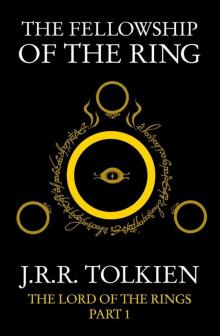 The Fellowship of the Ring
The Fellowship of the Ring The Hobbit
The Hobbit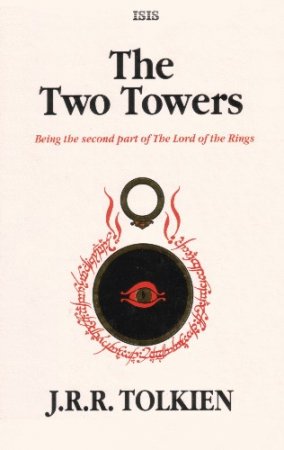 The Two Towers
The Two Towers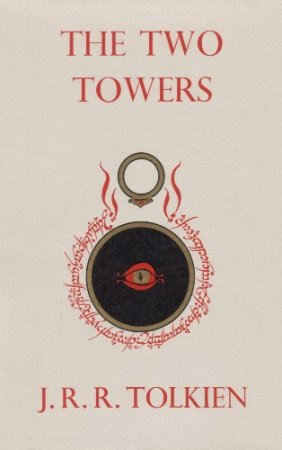 The Return of the King
The Return of the King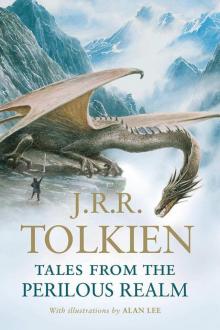 Tales From the Perilous Realm
Tales From the Perilous Realm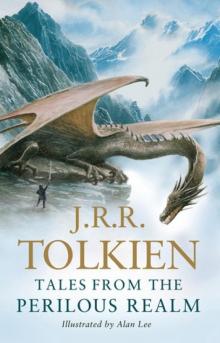 Leaf by Niggle
Leaf by Niggle The Silmarillon
The Silmarillon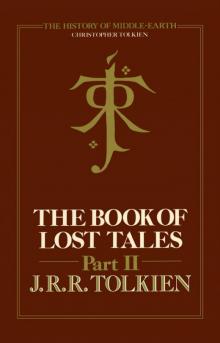 The Book of Lost Tales, Part Two
The Book of Lost Tales, Part Two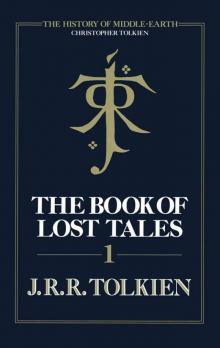 The Book of Lost Tales, Part One
The Book of Lost Tales, Part One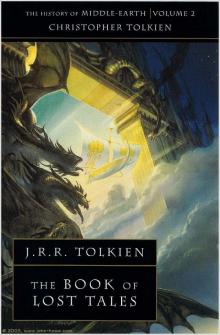 The Book of Lost Tales 2
The Book of Lost Tales 2 Roverandom
Roverandom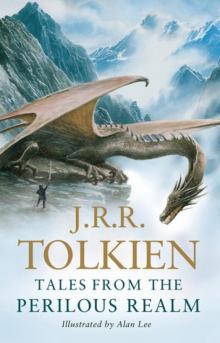 Smith of Wootton Major
Smith of Wootton Major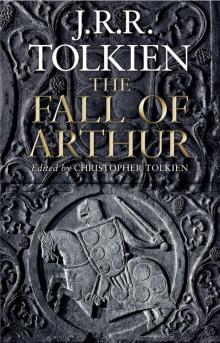 The Fall of Arthur
The Fall of Arthur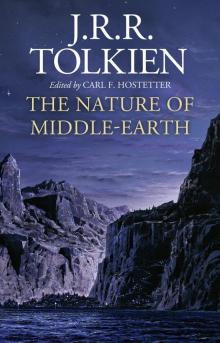 The Nature of Middle-earth
The Nature of Middle-earth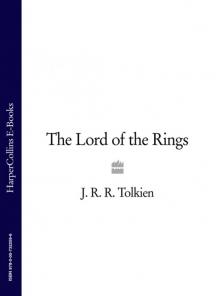 The Lord of the Rings: The Fellowship of the Ring, The Two Towers, The Return of the King
The Lord of the Rings: The Fellowship of the Ring, The Two Towers, The Return of the King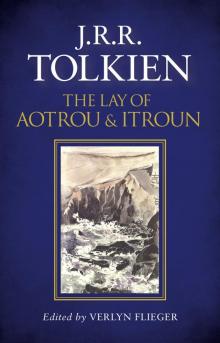 The Lay of Aotrou and Itroun
The Lay of Aotrou and Itroun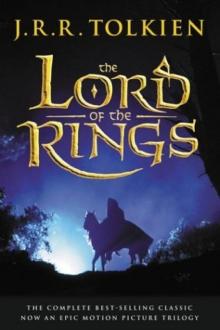 lord_rings.qxd
lord_rings.qxd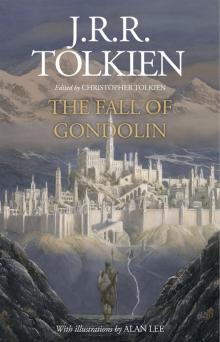 The Fall of Gondolin
The Fall of Gondolin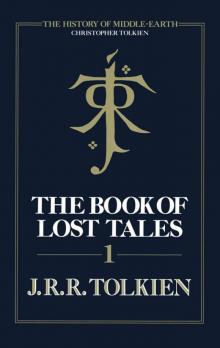 The Book of Lost Tales, Part 1
The Book of Lost Tales, Part 1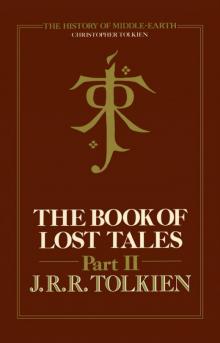 The Book of Lost Tales, Part 2
The Book of Lost Tales, Part 2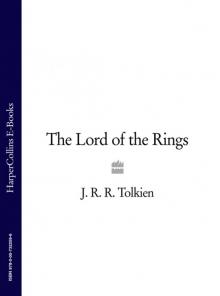 The Lord of the Rings
The Lord of the Rings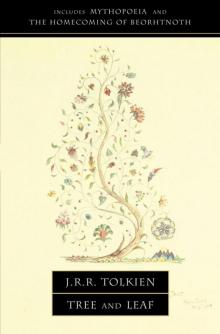 Tree and Leaf
Tree and Leaf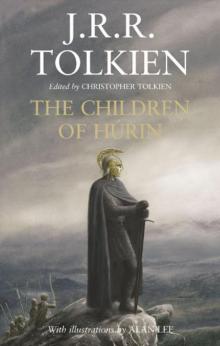 The Children of Húrin
The Children of Húrin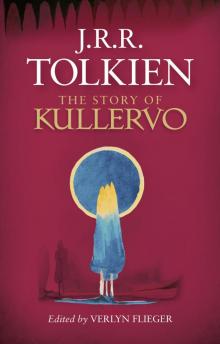 The Story of Kullervo
The Story of Kullervo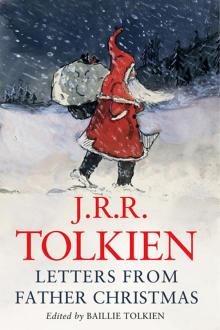 Letters From Father Christmas
Letters From Father Christmas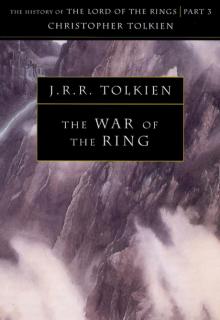 The History of Middle Earth: Volume 8 - The War of the Ring
The History of Middle Earth: Volume 8 - The War of the Ring Mr. Bliss
Mr. Bliss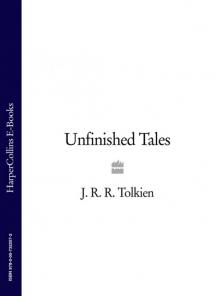 Unfinished Tales
Unfinished Tales The Adventures of Tom Bombadil
The Adventures of Tom Bombadil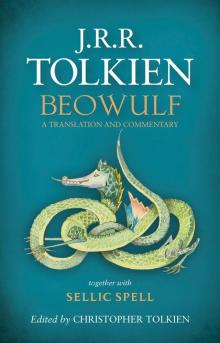 Beowulf: A Translation and Commentary, together with Sellic Spell
Beowulf: A Translation and Commentary, together with Sellic Spell The Silmarillion
The Silmarillion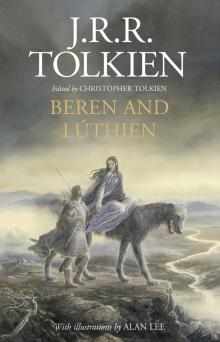 Beren and Lúthien
Beren and Lúthien